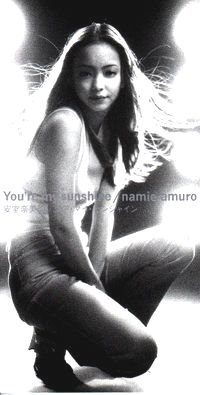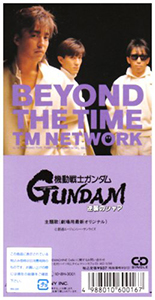
Tetsuya Komuro is a Japanese musician, songwriter and record producer. He is recognized as the most successful producer in Japanese music history and has introduced contemporary electronic dance music to the Japanese mainstream. He was also a former owner of the disco Velfarre located in Roppongi, Tokyo.

Ami Suzuki is a Japanese recording artist, DJ, and actress from Zama, Kanagawa, Japan. Having been discovered at the talent TV show Asayan, she was one of the most popular female teen idols in the late 1990s. However, in 2000, Suzuki faced legal problems with her management company resulting in a controversial blacklisting from the entertainment industry. Suzuki attempted to resurrect her career under her own steam with two indie singles before signing to Avex Trax in 2005. She released "Delightful", a dance song that reached No. 3 on the Japanese Oricon charts with a style similar to electronic club music, significantly different from her pop idol days. Since her appearance in the 2006 film Rainbow Song, Suzuki has gradually made a name for herself in the acting field, starring in various movies, television series, and musicals.

Fun for Fan is the first best of album released by the Sony Music label for Japanese singer Ami Suzuki on May 30, 2001.
Tomomi Kahara born Tomomi Shimogawara on August 17, 1974 in Tokyo), is a Japanese pop singer. She is famous for working with Tetsuya Komuro who gave her much success in the 1990s, which led to her deep dip in popularity after 1999, the year in which she released her first non-TK produced album, One Fine Day. Tomomi Kahara and Tetsuya Komuro dated for a few years, but they suffered from personal problems which led to their breakup. After a period of sickness, Kahara's talent agency terminated her contract on June 29, 2007.
"White Key" is the fourth single released by Japanese singer Ami Suzuki under music label Sony Music in December 1998.

"A Walk in the Park" is the eighth single by Japanese recording artist Namie Amuro from her third studio album Concentration 20 (1997). The song was released as the album's lead single on November 27, 1996, by Avex Trax. It was written, composed and produced by Tetsuya Komuro. The song is an electronic rock track, which features instrumentation from guitars, synthesizers, organs, keyboards and drums. Lyrically, it explores themes of loneliness, longing, and the desire for connection.

"You're My Sunshine" is the sixth single by Japanese singer Namie Amuro. It was released on June 5, 1996, by Avex Trax and was produced by Tetsuya Komuro. The song was the image song for the Bristol-Myers Squibb "Sea Breeze '96" commercial in which she appeared. The version used in the initial commercial had a different tempo and tune from the CD package version. The following year, 1997, she was used for the second consecutive year in a "Sea Breeze" commercial, this time using her hit song "How to Be a Girl".

"Body Feels Exit" is Namie Amuro's debut solo single on the Avex Trax label. Released nine days after her only album with former label, Toshiba-EMI, "Body Feels Exit" debuted in the top three on the Oricon chart and would be her first of 24 consecutive top-ten solo singles.

"Chase the Chance" is the fourth single by Japanese singer Namie Amuro from her second studio album, Sweet 19 Blues (1996). It was released as the album's second single on December 4, 1995, through Avex Trax.

"I Have Never Seen" is the twelfth single by Japanese singer Namie Amuro. It was released by Avex Trax on December 23, 1998, as the lead single to her fourth studio album Genius 2000 (2000). The song was written and composed solely by Tetsuya Komuro. It was the first single released after Amuro's return from her yearlong maternity leave, and was released approximately one week before her well-publicized official comeback at the 49th NHK Kohaku Uta Gassen. Musically, the song is a melancholic power ballad.
"Love the Island" is the debut single of Japanese singer Ami Suzuki released on July 1, 1998 through True Kiss Disc, sub-label of Sony Music Entertainment Japan owned by Tetsuya Komuro.

"Alone in My Room" is a song by Ami Suzuki, released as her second single in September 1998.

"All Night Long" is a song recorded by Japanese singer Ami Suzuki for her debut studio album, SA (1999). It was written and produced by Japanese producer and songwriter Tetsuya Komuro. The track was released following Suzuki's two collaborative efforts with Komuro. "All Night Long" premiered on November 5, 1998, as the third single from the album.
"Be Together" is a song from Japanese band TM Network released in 11 November 1987. It was written by Mitsuko Komuro and composed by Tetsuya Komuro, it was included in their fifth album Humansystem. Despite the fact that it wasn't released as a single and was not popular at its initial release, the 1999 cover made by Ami Suzuki the song became very popular in Japan, and it has since been covered by several artists.

L is the 50th single by Japanese singer-songwriter Ayumi Hamasaki, released on 29 September 2010. It is Hamasaki's last release from the three-part project to celebrate fifty singles. Its title, L, is the Roman numeral for fifty. All of the songs from the single EP were recorded in Los Angeles.

Arisa's Favorite: T.K. Songs is the second compilation album by Japanese recording artist Arisa Mizuki, released through Nippon Columbia on November 27, 1996. The twelve-track set is a collection of songs written and produced by Tetsuya Komuro, selected from Mizuki's past albums and singles. The compilation is Mizuki's last album on which she is credited as Arisa Mizuki.
"Boy Meets Girl" is a song by Japanese band TRF. The song was released on June 22, 1994 as their seventh single.

"Beyond the Time ~Möbius no Sora wo Koete~" is the 13th single by Japanese rock band TM Network, released on March 5, 1988 under Epic Records. Written by Mitsuko Komuro and Tetsuya Komuro, the song was used as the ending theme of the 1988 mecha anime film Mobile Suit Gundam: Char's Counterattack.

"Dreamed a Dream" is a song by Japanese singer-songwriter Ayumi Hamasaki. It was released as a digital single only on July 31, 2020.

"Itoshisa to Setsunasa to Kokoro Zuyosa to" is the fourth single by Japanese singer Ryōko Shinohara, released on July 21, 1994, by Epic Records/Sony Music Entertainment Japan under the Tokyo Performance Doll label Cha-Dance. Written and produced by Tetsuya Komuro, the song was used in the Japanese release of the 1994 anime film Street Fighter II: The Animated Movie during the scene where Ryu and Ken Masters team up to fight Vega/M. Bison. The B-side is "Good Luck", which was also featured in the film as the ending theme. An instrumental version of the song plays in the secret "Dramatic Battle" mode in Street Fighter Alpha, which also involves a team battle in which Ryu and Ken face Bison at the same time.















